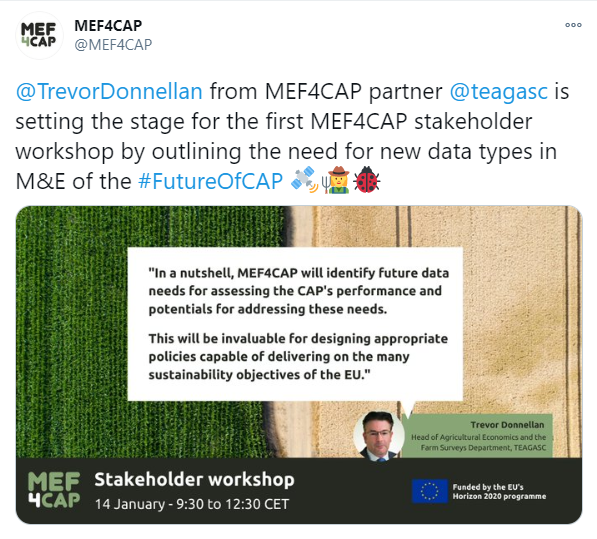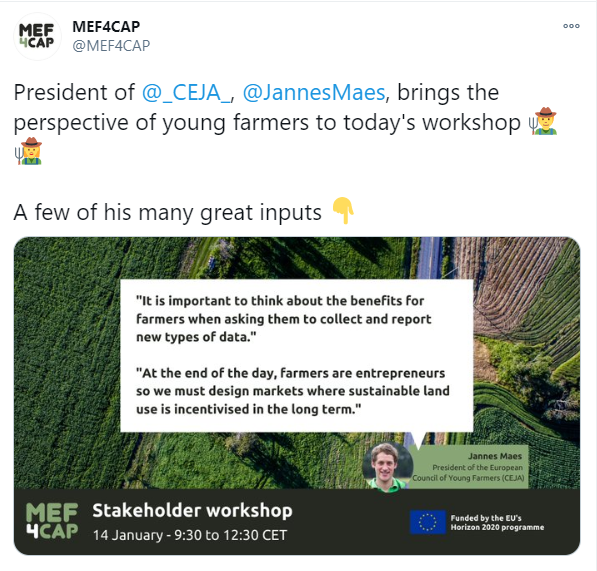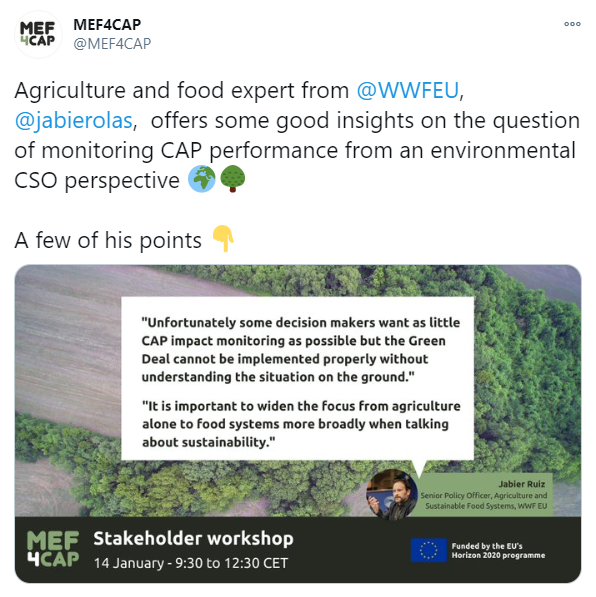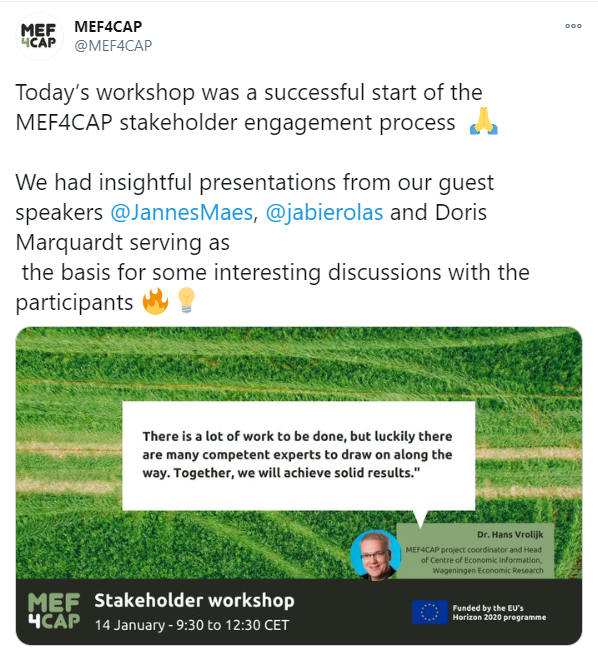Stakeholder workshop: measuring the success of the CAP in achieving sustainability
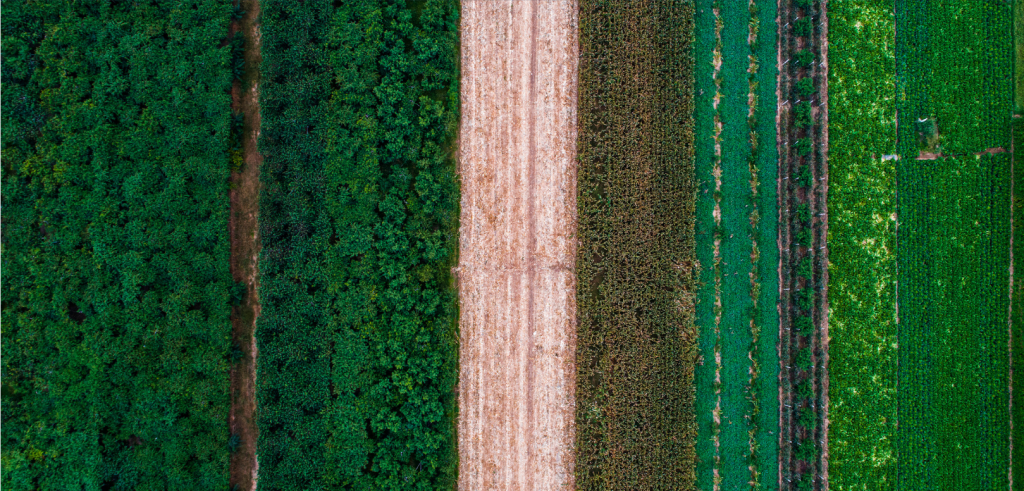

Stakeholder workshop: measuring the success of the CAP in achieving sustainability
With keynote presentations by WWF, the European Council of Young Farmers and the European Commission, the first MEF4CAP stakeholder workshop officially kickstarted the project. The crucial task of identifying new data needs to evaluate the CAP’s sustainability impacts has now begun.
Stakeholder engagement is an essential element of the MEF4CAP project. The process of including and engaging relevant actors working with CAP monitoring and evaluation (M&E) kicked off in the form of a workshop on January 14th, online of course, due to Covid-19 restrictions.
The workshop was part of the MEF4CAP project’s aim of identifying the policy modelling data gaps that already exist and those that could emerge as policy changes in the future. Ultimately, the aim is to provide a roadmap for future data needs to support policy developments, harnessing innovations in information and communication technology (ICT).
Invited insights
The workshop included three presentations by invited stakeholders, affording them the opportunity to provide their views on the important elements of sustainability and the data needs created by ongoing policy reform.
The first presentation was by Jannes Maes, president of the European Council of Young Farmers (CEJA), followed by food and agriculture expert from WWF Europe, Jabier Ruiz and, finally, Doris Marquardt from the European Commission’s Directorate for Agriculture.
A common theme across the presentations was a recognition of the increasing importance of environmental sustainability and that there is a strong interdependence between environmental, economic and social sustainability in agriculture.
The need to empower farmers to be successful, enabling them to adequately address each dimension of sustainability, was highlighted. Also emphasised were the importance of integrating farmers into the decision-making process and the need to design data collection systems whose benefits are clear to farmers.
Attention was drawn to the importance of recognising the achievements that have and continue to be made by farmers in addressing environmental sustainability. It was also pointed out that farms are extremely diverse and therefore have differing capacities and motivations to deliver on each sustainability dimension.
It was emphasised that there is a need for all EU countries to assist the data gathering to support policy design and evaluation. Concern was expressed that, without a strengthened data capacity, the EU would lack a governance mechanism to monitor the future CAP.
It was also argued that a broader definition of sustainability should be embraced, going beyond agriculture to consider sustainable food systems in general. And it was recognised that the green deal and the farm to fork initiative are set to move the CAP towards objectives that require the more explicit achievement of defined quantitative targets.
The presentations provided valuable inputs for the project team and set the stage for the subsequent open discussions of the necessary indicators for monitoring environmental and socio-economic sustainability.
Taking the temperature of the room
During the event, a series of polls allowed participants to provide their perspective on a range of statements associated with agricultural sustainability.
The polls covered questions such as the relative importance of environmental, economic and social aspects of sustainability, the need for new data, appropriate level of data gathering and farmers’ obligations to report data. The polling also addressed the question of how to balance usability and feasibility (cost and time) in data collection.
While there was no evident consensus in some of the polls, aspects of the polling indicated areas with a good level of agreement across the participants. Broadly, there was support for greater data collection to ensure that sustainability is more effectively measured, even if that requires more input on the part of farmers.
Other polling outcomes showed a recognition that the objective of improved data provision has to take into account the feasibility of data collection, with an emphasis on collecting data that has a strong degree of usability, to maximise the value of the data collection process.
Polling also suggested a view that environmental objectives would strongly influence the future direction of policy. There was a majority view that more data is needed to describe the social sustainability of agriculture. With respect to the economic sustainability the consideration of other aspect besides farm income was deemed to be important.
Full steam ahead
The key-note presentations, participant discussions and poll responses will be combined with a detailed document analysis of publications produced by a diverse range of stakeholders. This research will result in a comprehensive analysis providing an understanding of how agriculture-related policies in the EU may develop in the medium term. This in turn will allow for the development of a wish list of sustainability metrics relating to the monitoring and evaluation of agricultural sustainability in the EU.
The wish list of sustainability metrics developed in this early stage of the project will be used as a guide for work in subsequent stages of the project to determine whether data can be collected and by what means it should be collected. Subsequently, a roadmap will emerge with proposals for how data collection can be enhanced to better measure agricultural sustainability.
In the end, this will contribute to an outcome where new data can support the development of more targeted policies and help to refine its objectives and evaluate its implementation.
